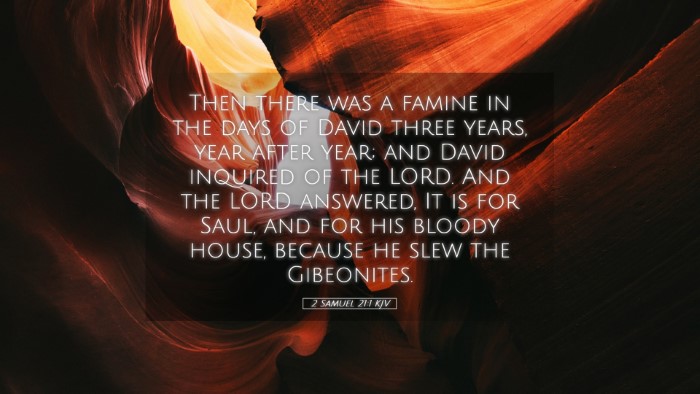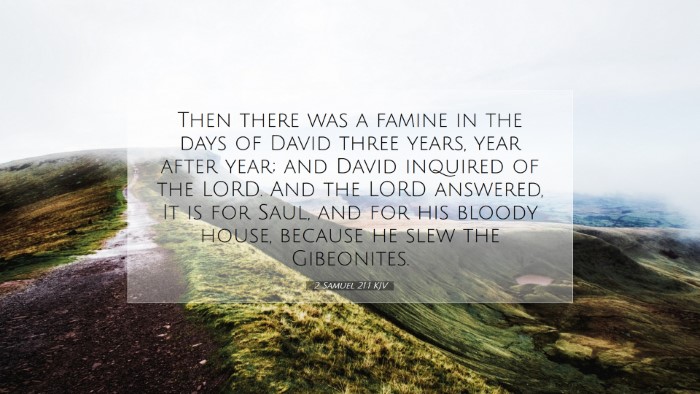Commentary on 2 Samuel 21:1
Verse Reference: 2 Samuel 21:1 - "Then there was a famine in the days of David three years, year after year; and David enquired of the LORD. And the LORD answered, It is for Saul, and for his bloody house, because he slew the Gibeonites."
Introduction
This verse introduces a significant turning point in the narrative of David's reign and reflects the profound relationship between sin, communal suffering, and divine judgment. The commentary draws on traditional interpretations from public domain sources, elucidating the complexities of this event and its implications for leadership, justice, and the covenant community of Israel.
The Context of Famine
Understanding Famine: The famine that lasted for three consecutive years is not merely a natural occurrence but is presented as an event steeped in God's providential dealings with Israel. Famine in biblical times was often seen as a direct consequence of sin, both individual and collective.
According to Matthew Henry's Commentary, the extended duration of the famine underscores that this was no ordinary event, but a sign that required particular attention from David. Famine served as both a challenge and a reflection of the people's spiritual state.
David's Inquiry
The Importance of Seeking God: David's response to the crisis is noteworthy. Instead of relying solely on human wisdom or political maneuvering, he chooses to inquire of the Lord. Albert Barnes emphasizes that this act of seeking God demonstrates a humility and recognition of divine sovereignty in governance. It illustrates the essential principle of seeking God in times of trouble, a practice that should resonate with leaders and believers alike.
God's Reveal of the Cause
Divine Judgment and its Roots: The Lord's response clarifies that the famine was a consequence of Saul's transgressions against the Gibeonites. This aspect highlights the interconnectedness of leadership decisions and their impact on the community. Adam Clarke points out that Saul's actions were not only a breach of faith but also indicative of a deeper issue regarding loyalty to covenant obligations. The Gibeonites had made a covenant with Israel (see Joshua 9), and Saul's slaughter of them represented a grave injustice that carried repercussions for the entire nation.
The Gibeonites' Role
The Gibeonites as a Symbol: The Gibeonites represent the outsiders who were included in Israel's covenantal community. Matthew Henry elaborates that their suffering due to Saul's violation of the covenant illustrates God's uncompromising nature regarding promises made in His name. The fact that the Lord held Israel accountable for the sins of its leaders stresses the moral responsibility that comes with authority.
Implications for Leadership
The events surrounding the famine serve as a sobering reminder for leaders in positions of power. They are called to recognize that their actions and decisions have far-reaching consequences on those they lead. Albert Barnes notes that leaders must exemplify a commitment to justice, mercy, and covenant loyalty to cultivate a healthy community.
Broader Theological Implications
Sin, Justice, and Redemption: This narrative highlights a broader theme in scripture concerning sin, consequences, and the need for atonement. The famine’s resolution would ultimately require action on David's part, which leads to the restoration of justice for the Gibeonites. Adam Clarke suggests that these events foreshadow God's redemptive work, wherein even through human failure, God orchestrates a path toward restoration and grace.
Conclusion
2 Samuel 21:1 serves as a profound reminder of the theological truths surrounding divine judgment, leadership accountability, and covenant fidelity. With David’s example of seeking the Lord in a crisis and the subsequent revelation regarding Saul’s sin, this passage urges all believers—especially those in leadership—to reflect on their responsibility towards both God and their communities. The intricate interplay of justice and divine providence illustrated in this verse calls for deep theological reflection and practice among pastors, scholars, and laypersons alike.


